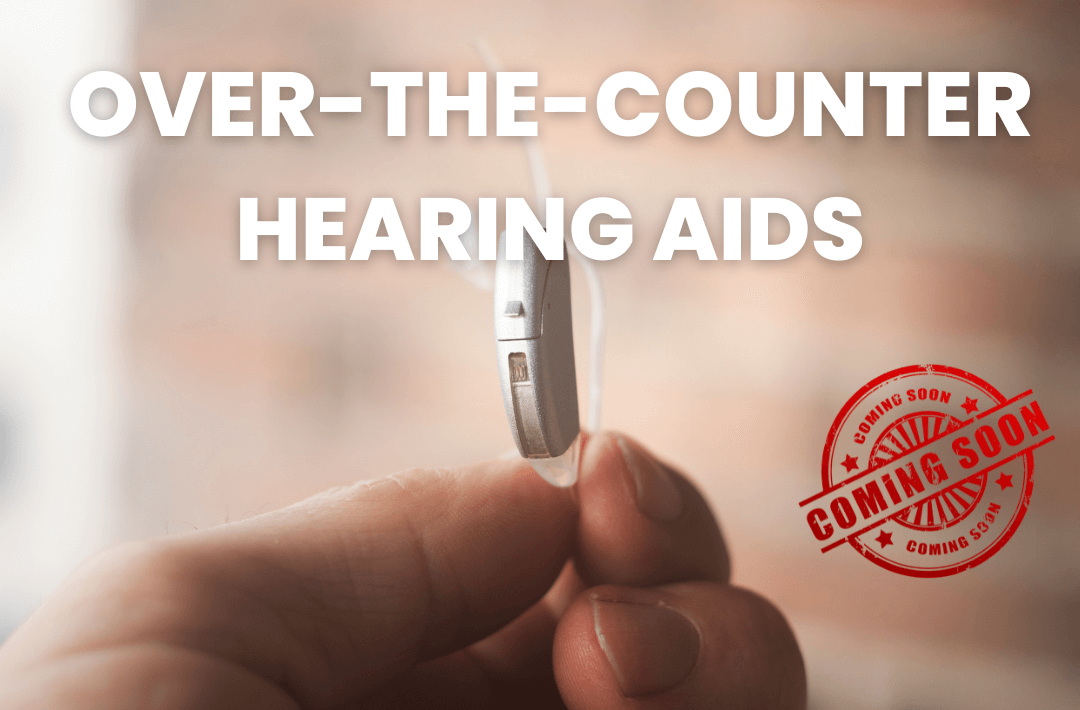They’re coming! In August 2022, the Food and Drug Administration (FDA) issued a rule allowing the sale of over-the-counter (OTC) hearing aids. They should hit the market in full force in mid-October 2022. Let’s answer the most popular question first:
Will CIHB offer OTC Hearing Aids?
Yes, Capital Institute of Hearing and Balance will offer OTC hearing aids for sale. We recognize the advantages of OTC hearing aids for specific users. In keeping with our philosophy to provide a full complement of services and tools to those with hearing loss, OTC hearing aids will be available for purchase in our clinic.
Do I Need a Hearing Test to Purchase OTC Hearing Aids?
No. Neither a hearing test nor appointment are required to purchase OTC hearing aids. However, some users may not feel confident interpreting the FDA labeling and determining whether they fit the user criteria. If a person desires, CIHB can assist in navigating OTC hearing aid purchases. Our optional add-on support includes several levels of services, including:
- A free online hearing screening;
- Clinical hearing evaluations for those who desire detailed information about their hearing loss to make a better-informed decision;
- Scheduled consultations to answer questions about hearing aids before purchase;
- Hearing evaluations and consultations for those with hearing loss interested in OTC hearing aids but do not meet user criteria.
Likewise, we offer add-on services and consultations to optimize OTC hearing aid use after purchase, independent of whether a hearing aid user acquires the devices from CIHB. These services include:
- Device orientation/instruction
- Troubleshooting
- Verification that the hearing aids amplify appropriately
Now that we’ve answered your most common questions, let’s get back to the basics.
What are OTC hearing aids?
OTC hearing aids are hearing devices sold directly to consumers without a prescription, medical evaluation, or hearing test.
Who Is Eligible for OTC Hearing Aids?
The FDA has specified the intended OTC hearing aid user in its official rule. These specifications will appear on the OTC hearing aid package label or insert. The rule indicates that OTC hearing aids are suitable for:
- Adults 18 years of age and older
- With perceived mild to moderate hearing loss
- Who exhibit no “red flag” conditions or symptoms. Red flag symptoms should be evaluated by a medical professional. They include but are not limited to fluid, pus, or blood coming from ears, worse hearing in one ear, or sudden or fluctuating hearing loss. Please see the FDA label for complete information.
How Do I Know If I Have a Mild to Moderate Hearing Loss?
The most accurate way to determine a person’s degree of hearing loss is to seek a hearing evaluation by a medical professional. However, a mild to moderate hearing loss may be characterized by:
- Difficulty understanding soft speech, speech at a distance, or speech in the presence of background noise;
- Speech frequently seems loud enough but is unclear;
- Difficulty hearing or understanding soft consonant sounds (e.g., the f, s, and th sounds)
- Asking others to repeat themselves;
- Slightly increasing the volume on the television, mobile phone, or radio.
- For the FDA’s detailed label on perceived mild to moderate hearing loss, click here.
What Are Some Potential Benefits of OTC Hearing Aids Over Prescription Hearing Aids?
The primary benefits of OTC hearing aids are cost and convenience. Industry experts project OTC devices will be cheaper than prescription hearing aids. Professional services for prescription hearing aids include custom fitting, verifying the device settings, orientation, and personalized sound adjustments. Therefore, OTC hearing aids users will theoretically save time and money on office visits by bypassing professional involvement.
OTC hearing aids may reach consumers with hearing loss for whom hearing aid cost and ease of access were barriers. The FDA ruling can benefit millions of Americans with hearing loss by improving access to hearing care.
What Are Some Potential Downsides?
- The FDA requires OTC hearing aids to be adjustable by the user. However, users may be unable to tune OTC hearing aids to their specific hearing loss as precisely as prescription hearing aids.
- Some hearing professionals worry that consumers may not accurately estimate their degree of hearing loss and, therefore, their eligibility for OTC hearing aids. Research suggests that younger users may overestimate their hearing loss, while older users underestimate their degree of hearing loss.
- OTC hearing aids do not include the help of a hearing professional to optimize settings, program and adjust the aids, orient the user to the devices, or instruct on their use. Levels of customer service and support will vary depending on the company.
- Theoretically, a user with a poor OTC hearing aid experience may stop using hearing devices altogether. They may not realize that other devices could better meet their needs.
If I Am Not Satisfied with My OTC Hearing Aids, What Are My Options?
OTC hearing aids should include detailed instructions on adjusting and troubleshooting the devices. Each set of instruments should also have a specified return policy and customer service information. However, if you would like additional, independent assistance with your OTC devices, contact Capital Institute of Hearing and Balance for help.
Additional reading from reputable organizations:


